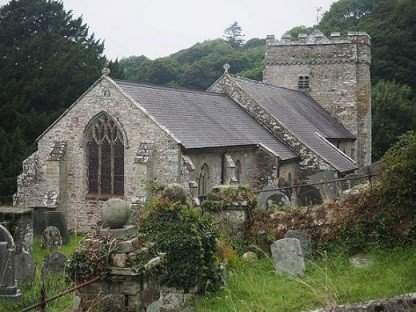Ardent Church Folk
Richard E. Huws is on the family history trail
Cymdeithas y Penrhyn is a literary society that meets every month during the winter in the Penrhyn-coch area, near Aberystwyth. At the end of the term they organise a trip - this year they chose to travel to north Pembrokeshire. We visited the town and castle of Cardigan, St. Brynach's Church, Nevern and Melin Tregwynt, near Fishguard.

I was particularly looking forward to visiting St Brynach's Church. I was last there in 1971. At the time I was an apprentice librarian at the National Library and had started researching my family history.
The roots of the Hughes family run deep in north Pembrokeshire. My great-great-grandfather was buried in Nevern Church, and his ancestors were buried in Eglwyswrw. I saw his grave in 1971 and made a copy of the inscription, but I had considerable trouble finding it again on this trip. After searching for some time, I eventually found it covered by a growth of ferns.
My family were ardent church folk and produced a considerable number of priests and bishops. Caleb Hughes, Benjamin's brother, was the father of Joshua Hughes (1807-1889), Bishop of St Asaph, and his son, Joshua Pritchard Hughes (1847-1938), was Bishop of Llandaff. My grandfather, Eynon Hughes, was vicar of Trelech and Betws early in the twentieth century and his younger brothers, Jacob and Thomas, were also priests in Birkenhead and Australia. And John Lloyd (1847-1915), cousin of Lydia Lloyd, my grandfather's mother, was Bishop of Swansea. And several other members of the family also ministered in the Church.
When I moved to Tregaron in the early 1970s, I had no connection with the area, other than being able to claim that John Hughes (1804-1870), who had been a local vicar and was the older brother of Bishop Joshua, had been mentioned by George Borrow in his volume Wild Wales published in 1862!
“The clerk told me that the name of the clergyman of Tregaron was Hughes; he said that he was an excellent, charitable man, who preached the Gospel, and gave himself great trouble in educating the children of the poor. He certainly seemed to have succeeded in teaching them good manners: as I was leaving the church, I met a number of little boys belonging to the church school: no sooner did they see me than they drew themselves up, a rank on one side, and as I passed took off their caps and simultaneously shouted, "Good-morning!"